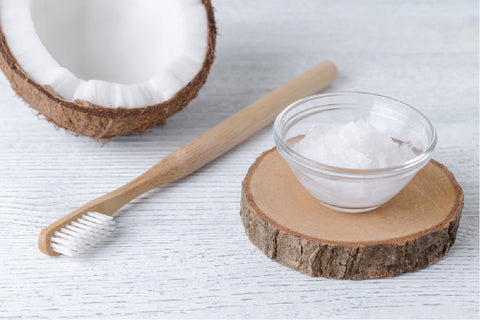Coconut oil isn't just for cooking; it's a powerhouse for teeth whitening. A gleaming smile is a universal symbol of health and beauty. While numerous teeth-whitening products are on the market, some natural remedies like coconut oil have gained popularity for their effectiveness.

But does coconut oil for teeth work? Coconut oil offers many benefits for teeth whitening and oral health. In this blog, we'll explore how coconut oil can brighten your smile and provide you with easy-to-follow methods for using it.
Coconut Oil Benefits For Teeth Whitening
Discover the remarkable world of coconut oil for teeth whitening and its exceptional ability to transform your smile. This enlightening exploration explores the myriad ways coconut oil benefits teeth whitening.
1. Prevent Tooth Decay
Coconut oil contains lauric acid, a fatty acid with potent antibacterial properties. These bacteria are responsible for plaque formation and acid production, which can lead to tooth decay.

When you use coconut oil for oil pulling or as a part of your oral care routine, the lauric acid helps combat harmful bacteria in your mouth. By reducing the bacterial load, coconut oil contributes to the prevention of tooth decay.
2. Less Bad Breath
Coconut oil's antibacterial properties help control the growth of these bacteria, leading to improved oral hygiene.

One of the primary causes of bad breath is the proliferation of odor-producing bacteria in the mouth. You can enjoy fresher breath with a healthier oral environment and fewer bacteria responsible for foul odors.
3. Stop Gum Bleeding
Regular use of coconut oil in your oral care routine can help reduce inflammation and fight the bacteria that contribute to gum disease.

Gum bleeding is often a sign of gum inflammation or gingivitis; if left untreated, it can become a bigger problem. This, in turn, can lead to a decrease in gum bleeding, promoting healthier gums.
4. Prevent Tooth Loss
When harmful bacteria are kept in check, there is a lower risk of tooth decay and gum disease, significant contributors to tooth loss.

Coconut oil's ability to strengthen teeth stems from its antibacterial properties and its promotion of better oral hygiene. Stronger, healthier teeth are less likely to become compromised and ultimately lost.
5. Lessen Tooth Sensitivity
Tooth sensitivity is often caused by exposed dentin, the sensitive layer beneath the enamel. Coconut oil promotes overall oral health by reducing the risk of tooth decay and gum disease.

Additionally, it can help soothe and nourish the sensitive areas of the teeth, providing relief from sensitivity over time. The overall health of your oral cavity plays a crucial role in diminishing tooth sensitivity.
How To Use Coconut Oil For Teeth Whitening?
Coconut oil has emerged as a natural superstar for teeth whitening. In this guide, we explore effective methods and techniques to harness coconut oil's power for teeth for a more confident smile.
1. Coconut Oil And Activated Charcoal For Teeth Whitening
This natural teeth-whitening combination uses activated charcoal's absorbing power and coconut oil's antibacterial properties for a dazzling smile.

Ingredients:
- Virgin Coconut Oil - 1 Tablespoon
- Activated Charcoal Powder - 1/4 Teaspoon
Directions:
Step 1: Add ¼ teaspoon of activated charcoal powder with one tablespoon of virgin coconut oil in a small bowl.
Step 2: Once you made the paste, put it on a toothbrush.
Step 3: Gently brush your teeth for 2-3 minutes.
Step 4: Once brushed, rinse your teeth thoroughly.
Step 5: Use this method at least twice; thrice is best.
2. Baking Soda And Coconut Oil For Teeth Whitening
A classic combination, baking soda's gentle abrasive action and coconut oil's antibacterial properties make for an effective teeth-whitening paste.

Ingredients:
- Baking Soda - 1 Teaspoon
- Virgin Coconut Oil - 1 Tablespoon
Directions:
Step 1: Baking soda is great for teeth whitening; mix one tablespoon each of coconut oil and baking soda.
Step 2: Use your gentle brush with this paste.
Step 3: Use gentle circular strokes for 2-3 minutes.
Step 4: Thoroughly rinse your mouth with normal water.
Step 5: Use this paste 2-3 times a week for best results.
3. Turmeric And Coconut Oil For Teeth Whitening
Turmeric's natural color may seem counterintuitive, but it's renowned for its stain-removing properties when paired with coconut oil.

Ingredients:
- Turmeric Powder - 1/4 Teaspoon
- Virgin Coconut Oil - 1 Tablespoon
Directions:
Step 1: Mix the turmeric powder with the coconut oil to make a paste.
Step 2: Apply the paste to your toothbrush like any other toothpaste.
Step 3: Brush your teeth gently for 2-3 minutes.
Step 4: Rinse your mouth and teeth thoroughly with regular water.
Step 5: Use this method 2-3 times a week for best results.
4. Hydrogen Peroxide And Coconut Oil For Teeth Whitening
Hydrogen peroxide is known for its teeth-whitening properties, and when combined with coconut oil, it can be an effective solution for brighter teeth.

Ingredients:
- Virgin Coconut Oil - 1 Tablespoon
- Food-Grade Hydrogen Peroxide - 1 Teaspoon
Directions:
Step 1: Mix the hydrogen peroxide with virgin coconut oil in a small bowl.
Step 2: Apply the mixture to your toothbrush.
Step 3: Brush your teeth gently for 2-3 minutes.
Step 4: Rinse your mouth thoroughly with water.
Step 5: Use this method 1-2 times weekly for best results.
5. Clove And Coconut Oil For Teeth Whitening
When combined with coconut oil, Clove's antimicrobial properties can help improve oral health and gradually whiten teeth.

Ingredients:
- Clove Essential Oil - 2 Drops
- Virgin Coconut Oil - 1 Tablespoon
Directions:
Step 1: Mix the clove essential oil with coconut oil.
Step 2: Apply the mixture to your toothbrush.
Step 3: Brush your teeth gently for 2-3 minutes.
Step 4: Rinse your mouth with cold water.
Step 5: Use this method 2-3 times a week for best results.
6. Coconut Oil And Lemon Juice For Teeth Whitening
Lemon juice's acidity, when used sparingly, can help remove stains when combined with coconut oil for an overall teeth-whitening effect.

Ingredients:
- Fresh Lemon Juice - 1 Teaspoon
- Virgin Coconut Oil - 1 Tablespoon
Directions:
Step 1: Mix the fresh lemon juice with coconut oil.
Step 2: Apply the mixture to your toothbrush.
Step 3: Brush your teeth gently for 2-3 minutes.
Step 4: Rinse your mouth with regular water.
Step 5: Use this method once weekly or less frequently, as lemon juice can be acidic and potentially erode tooth enamel.
Frequently Asked Questions
If you have any queries on coconut oil for teeth, here are answers to some of the frequently asked questions for your help.

Q1: Does Coconut Oil Work For Teeth Whitening?
Ans: Yes, coconut oil can be effective for teeth whitening. It contains lauric acid, which has antibacterial properties that help reduce the buildup of plaque and stains on teeth. Additionally, coconut oil may gradually remove surface stains, making your teeth appear whiter over time.
Q2: What Can I Mix With Coconut Oil To Whiten My Teeth?
Ans: Coconut oil can be combined with various natural ingredients to enhance its teeth-whitening properties. Some popular options include activated charcoal, baking soda, turmeric, hydrogen peroxide, clove, and lemon juice. These ingredients can be mixed with coconut oil to create homemade teeth-whitening pastes or rinses.
Q3: How Fast Does Coconut Oil Whiten Teeth?
Ans: The speed at which coconut oil whitens teeth can vary from person to person. Generally, it's a gradual process that may take a few weeks to notice significant results. Consistent use, such as daily oil pulling or brushing with coconut oil-based mixtures, can gradually improve tooth color.
Q4: What Kind Of Coconut Oil Is For Teeth Whitening?
Ans: When using coconut oil for teeth whitening, it's recommended to use organic, cold-pressed, and unrefined coconut oil. These types of coconut oil retain more of their natural compounds and beneficial properties. Avoid refined coconut oil, as it may not offer the same benefits.
Q5: Can Coconut Oil Make Teeth White?
Ans: Coconut oil can help improve the appearance of your teeth by removing surface stains and promoting better oral hygiene. However, it may provide a different level of whitening than professional teeth-whitening treatments or commercial whitening products. The results can vary depending on the extent of staining and individual factors.
Q6: How Do You Make Your Teeth Whiter With Coconut Oil?
Ans: Choose your preferred method, such as oil pulling, brushing, or making a homemade paste. If oil is pulling, swish a tablespoon of coconut oil in your mouth for 10-20 minutes before spitting it out. First, brush your teeth, then rinse it thoroughly. Be consistent with your chosen method and patient, as results may take time to become noticeable.
Conclusion
Coconut oil is a natural, cost-effective, and highly efficient way to achieve a brighter smile. Its remarkable benefits extend beyond teeth whitening, improving oral health and hygiene. Get all the ingredients at one portal at www.VedaOIls.com. VedaOils offers high-quality coconut oil for teeth whitening.











 Sign in
Sign in Register now
Register now My Reward Points
My Reward Points









